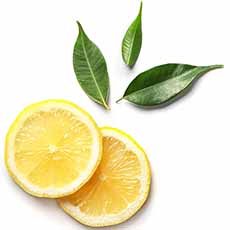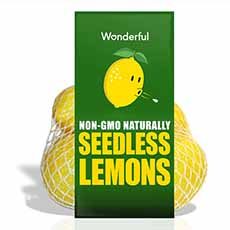PRODUCT OF THE WEEK: Wonderful Seedless Lemons
|
|
We love lemon: not just lemon-flavored foods and drinks, but the slices, wedges, or halves served with foods and drinks. When baking and cooking, 79% of responders to a survey* say they use lemons as an ingredient, and 73% use lemons for making drinks. There’s nothing like a squeeze of fresh lemon juice to perk up: A whopping 83% of those surveyed said they were likely to purchase seedless lemons. And now, you can buy seedless lemons! The Wonderful Company—sellers of POM Wonderful, FIJI Water, Wonderful Halos, Wonderful Pistachios and more—has introduced Wonderful Seedless Lemons, a naturally seedless, Non-GMO Project Verified variety of lemon. Wonderful Seedless Lemons, now rolling out in produce aisles at grocery stores nationwide and online at Amazon Fresh, is a welcome upgrade. The only fly in the lemon juice is that seedless lemons will command a 50% premium over regular lemons. But now that we’re headed into the biggest cooking and entertaining weeks of the year, don’t you deserve them? (And while the holiday season doesn’t coincide with the introduction of Wonderful Seedless Lemons, mark your calendar for August 29th, National Lemon Juice Day.) While other fruits have been bred to be seedless, the standard lemon varieties such as Eureka and Lisbon have been hard to crossbreed into a seedless variety†. The Wonderful Seedless Lemon was created in Queensland, Australia by a farmer who set out to create a seedless lemon using innovative breeding techniques‡. After a number of years, he finally found a seedless lemon tree in his orchard and began to grow them commercially. The Wonderful Company procured the exclusive North American rights to grow them, and Wonderful Seedless Lemons are now being introduced in the U.S. and Canada. For more information, visit WonderfulSeedlessLemons.com. |
|
|
________________ *Results of a third-party study commissioned by The Wonderful Company that surveyed lemon buyers nationwide. †It’s because both lemons closely derive from one ancestor, a natural hybrid of citron and sour orange that originated thousands of years ago in northeastern India. Thus, new attributes from the DNA cross-breeding is limited./span> Almost all true lemons contain seeds, and although the number varies greatly from a few to dozens, depending on season and pollination, there’s no way to tell from the outside how many pips (the word for small, hard seeds) lie within. Some lemon trees occasionally develop natural mutations which can be seedless. Some 25 years ago, a few California growers planted a mutant variety called Seedless Lisbon that came from Australia. However, on average it bore a quarter less fruit than standard seeded lemons, so was not economically viable. Other growers around the world have attempted to grow seedless lemons, but until now, the seedless varieties proved insufficiently productive or shapely to compete with regular lemons [source]. ‡For food geeks, here’s how it was done by the originator, 2PH Farms: Starting in the late 1990s with Eureka lemon bud sticks, wood for grafting was treated with gamma irradiation to induce mutations that rendered their progeny seedless. But of course, it took years of experimenting to get to commercially viable seedless lemons. |
||




